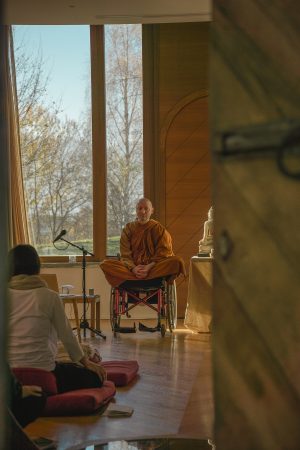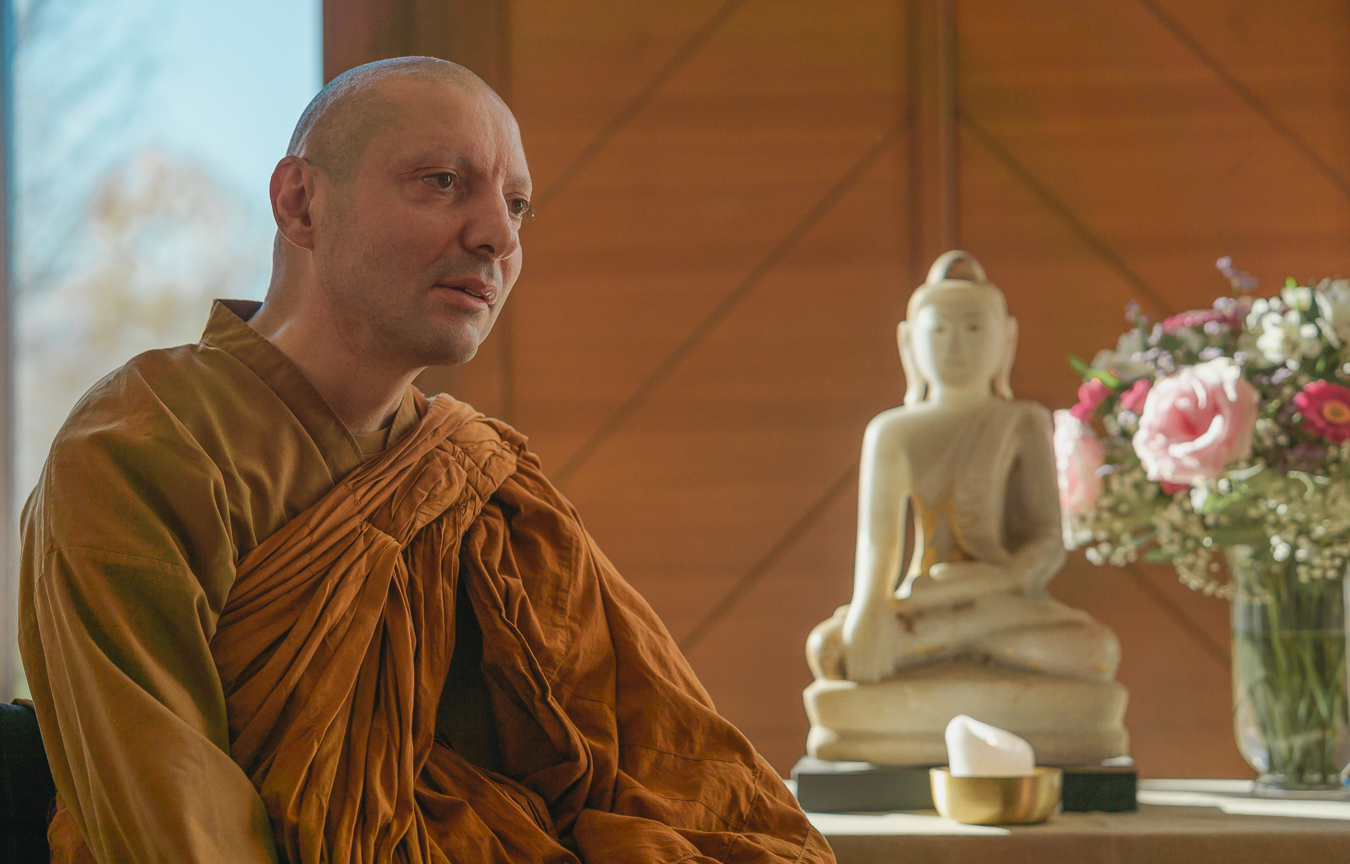Can you tell us a little about your lineage? Is it part of the Thai Forest Tradition?
Yes, our lineage is the Ajahn Chah and Sumedho lineage, and we are part of the Thai Forest Tradition. We belong to a network of monasteries spread around the world. Most of them are in Thailand, but there are also four in England, one in Switzerland and others in Portugal, Germany, the USA and Australia.
I am from Santacittarama Monastery in Italy, but this tradition originated in Thailand, but over time, Western monks trained there returned to their home countries and established monasteries, like Santacittarama.
Was there a specific moment in your life that made you decide to become a monk?
I decided to try being a monk when I was 29, and I was later accepted into the community. The decision came from two emotions. One was a sense of suffering and dissatisfaction, a feeling of “Is this all there is?” And the other was trust—trust in the teachings of the Buddha and in the possibility of doing something meaningful, something good.
Before becoming a monk, I spent about ten years meditating, exploring different traditions and approaches. When I encountered the Thai Forest Tradition, I felt at home. I understood it, and I could sustain the practice.
I was lucky to meet Ajahn Sumedho, who inspired me deeply—not just to be a Buddhist but to try to become a monk. His way of living and teaching impressed me, especially since he trained in Thailand for ten years before returning to the UK in 1976. He is still alive, very powerful. What inspired me was his freedom, his independence—it gave me the sense that I could give my life meaning and perhaps help others too.
What is the most common struggle your students come to you with?
Confusion. People don’t know what to do with their lives. It’s quite surprising. Many people don’t know what to do – even when they’re older—60, 70 years old. They’re searching for meaning and direction.
I would tell people to first to simply take responsibility for their life, and start to learn how to make the right choices. Not to make decisions to promote ourselves, but to promote the Dhamma, the freedom of the heart, the awakening of their mind. To prepare this possibility, to prepare the proper conditions for the mind to realise this. That’s what I would like to pass on.
We can learn how to prepare for the path of awakening, it’s not just hoping for something to happen, but how to learn how to develop this. I’m quite optimistic in humanity – that all can do this, can do a good job with this – just that we have to create the proper opportunity for this to unfold.
Do you believe silence and Vipassana retreats play a significant role in addressing these struggles?
Yes, retreats like these are very supportive. But they are just the beginning. People need continuity in their practice—one retreat is not enough.
In these few days, people can figure out what is really important to them. The challenge is arranging their lives afterward to reflect those priorities. Often, people’s hearts are spread everywhere—a little here, a little there, but they rarely focus their hearts on one purpose. They see it like a financial investment, but it doesn’t work like this. True freedom comes from dedicating ourselves to one meaningful purpose.
This doesn’t mean being sectarian or obsessed. It means offering our lives to something we believe is truly worthy—not just for ourselves, but for others too.

Do you think people living “normal” lives, with jobs and families, can live this kind of purposeful life?
Yes, definitely. Our daily life can be our temple. It’s not about what we do, but how we do it. Even something as simple as washing dishes, and that can be a perfect cleaning of the mind. The problem is that we don’t perceive this action as a step towards enlightenment.
Of course there is some action and speech that should be avoided, some things that do not support our morality, but in the end our monastic life is quite ordinary. We also deal with ordinary tasks—working, interacting with people, and managing daily responsibilities. I take care of the accounts, and my friend here takes care of other tasks. The difference is in how we approach these actions, seeing them as part of the path toward awakening.
How are you finding your time at Mandali?
It’s an amazing place—beautiful in every way. I was surprised at the details – the attention to detail here is remarkable. I can feel the care and heart that went into creating it.
I’ve been a guest monk for 19 years and hosted in many places, but I’ve never experienced such a reception. Rafal even came to meet me at the gate! I feel very cared for here, also the participants.
Is there a story or teaching from the Theravada tradition that inspires you which you’d like to share?
One of my favorite teachings is from Ajahn Chah, who established our lineage:
“If you let go a little, you will have a little happiness.
If you let go a lot, you will have a lot of happiness.
If you let go of everything, you will realise happiness.”
This really touched me, and if you go this way, this way of letting go, there is a real possibility of finding the freedom of the heart.
To know more about the Santacitarrama Monastery where the Venerable Ajahn resides, you can go here. The autumn Vipassana retreat at Mandali was organised in collaboration with the “Progetto Pienessere”, an association dedicated to transpersonal mindfulness, inspired by teachings from the Karuna Institute and wisdom from various spiritual traditions. It focuses on nurturing the transcendent aspects of consciousness to foster relationships based on kindness and mutual respect, creating opportunities for elevated connection and spiritual growth.


